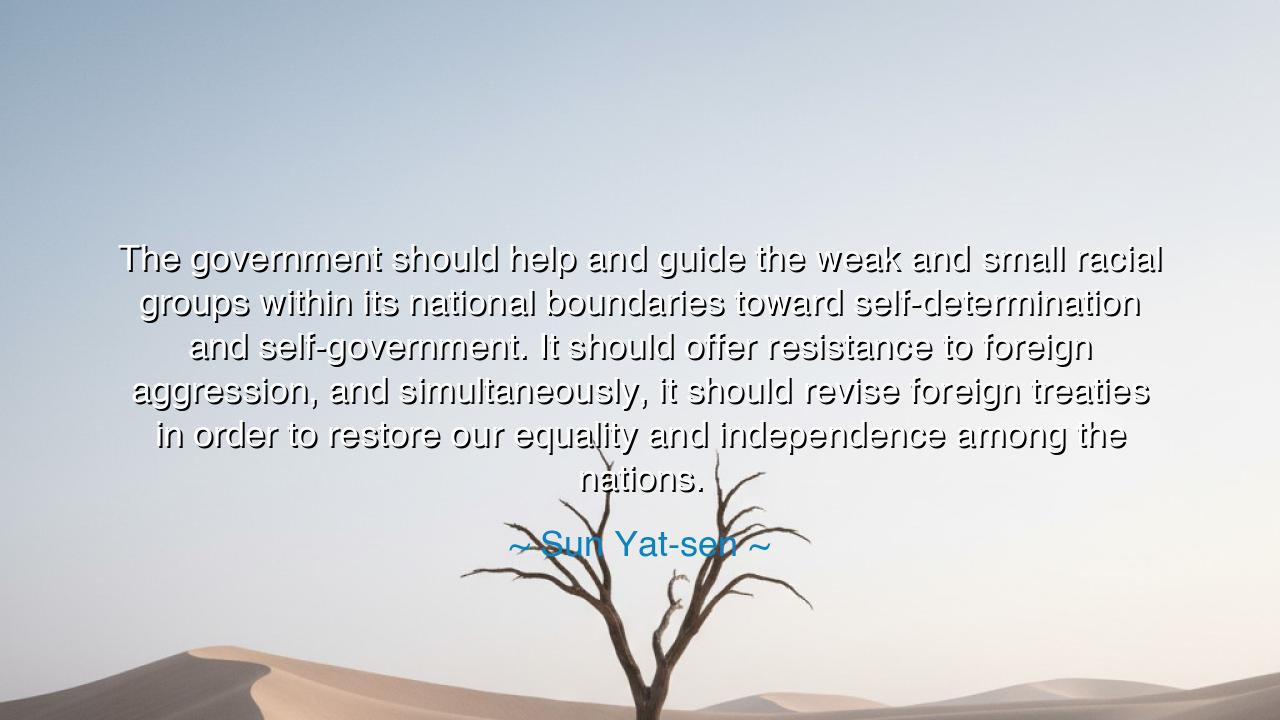
The government should help and guide the weak and small racial
The government should help and guide the weak and small racial groups within its national boundaries toward self-determination and self-government. It should offer resistance to foreign aggression, and simultaneously, it should revise foreign treaties in order to restore our equality and independence among the nations.






The words of Sun Yat-sen, when he declared, “The government should help and guide the weak and small racial groups within its national boundaries toward self-determination and self-government. It should offer resistance to foreign aggression, and simultaneously, it should revise foreign treaties in order to restore our equality and independence among the nations,” shine with the brilliance of a mind both visionary and compassionate. In them, he reveals his dream of a nation not built upon domination or division, but upon unity, justice, and independence. These words, spoken by the Father of Modern China, are a hymn to the balance between power and virtue — between the might to defend and the wisdom to uplift. For Sun understood that the true strength of a nation lies not in conquest, but in the dignity it grants both its people and its neighbors.
To understand the full depth of this teaching, one must first know the man who spoke it. Sun Yat-sen was not merely a revolutionary; he was a moral architect. He lived in an age when China, once the center of civilization, lay humbled under the shadow of foreign powers. The treaties imposed upon it — unequal, exploitative, and unjust — had stripped the nation of its sovereignty and pride. Amid this humiliation, Sun rose not with vengeance, but with vision. He sought to awaken his people to a new order — one guided by the Three Principles of the People: nationalism, democracy, and people’s livelihood. These were not mere political doctrines but moral pillars upon which he hoped to rebuild both China and humanity.
In this particular quote, he addresses the sacred responsibility of government — to protect the weak within and to defend the nation without. He calls upon rulers not to exploit their minorities, but to guide them toward self-determination — to nurture their growth until they stand as equals, not subjects. To Sun, the greatness of a nation was measured by how it treated its smallest communities. The government, he believed, should act as a teacher, not a tyrant; a protector, not an oppressor. The weak and small racial groups, though often overlooked, were threads in the same tapestry of civilization — and to neglect them was to weaken the whole. This was the compassion of a true statesman: to see unity not as uniformity, but as harmony among differences.
At the same time, Sun warned that compassion must not mean submission. A government that fails to resist foreign aggression ceases to be the guardian of its people. He spoke these words at a time when China’s sovereignty was carved away by imperial powers, its ports occupied, its economy drained. Yet even then, Sun’s call was not for hatred, but for dignity. He sought a nation strong enough to stand as an equal among the nations — independent, yet just; powerful, yet humane. To revise foreign treaties, as he said, was not merely to reclaim territory, but to restore moral equilibrium — to demand that nations meet as peers, not as master and subject. His voice was that of a moral warrior — fierce in defense of principle, yet guided by righteousness rather than revenge.
Consider how these ideals took form in his life. When Sun led the revolution that overthrew the Qing dynasty in 1911, he did not seek personal power. Instead, he laid the foundation for a republic — a new order where the people would be the masters of their destiny. Yet even in victory, he saw the fragility of unity. He worked tirelessly to bring together the divided provinces and warring factions, believing that only through shared purpose could China rise again. He traveled from country to country, gathering support, not with the promise of empire, but with the vision of equality — a world where nations would coexist as brothers. Though he died before seeing this dream fulfilled, his legacy lived on, shaping the conscience of Asia and inspiring all who strive for freedom and self-rule.
Sun’s wisdom is not bound by geography or time. His message speaks to every nation and every generation that struggles between the temptation of power and the duty of justice. He teaches that independence cannot be bought through isolation, nor can equality be achieved through oppression. True strength arises when the strong lift up the weak, and when freedom is guarded not by greed, but by virtue. A government, he reminds us, exists not for itself but for the people — and among those people, none must be forgotten.
So, O listener, take this lesson to heart. In your life, as in the life of nations, seek the balance that Sun Yat-sen preached. Guide, do not dominate. Protect, do not exploit. Stand firm against injustice, yet act with compassion toward the powerless. Let your independence never harden into pride, nor your strength into cruelty. Just as a great nation must honor its smallest tribes, so too must every great soul honor those who depend upon it.
Thus, the wisdom of Sun Yat-sen endures: that the road to equality and independence is paved not only with courage, but with care. A nation that uplifts its weakest members becomes unconquerable from within; a people who live by justice become unassailable from without. Let us, then, build our own lives and our own nations upon this sacred foundation — to be strong, yet kind; independent, yet united; free, yet faithful to the good of all. For in such harmony lies the true destiny of humankind.






AAdministratorAdministrator
Welcome, honored guests. Please leave a comment, we will respond soon